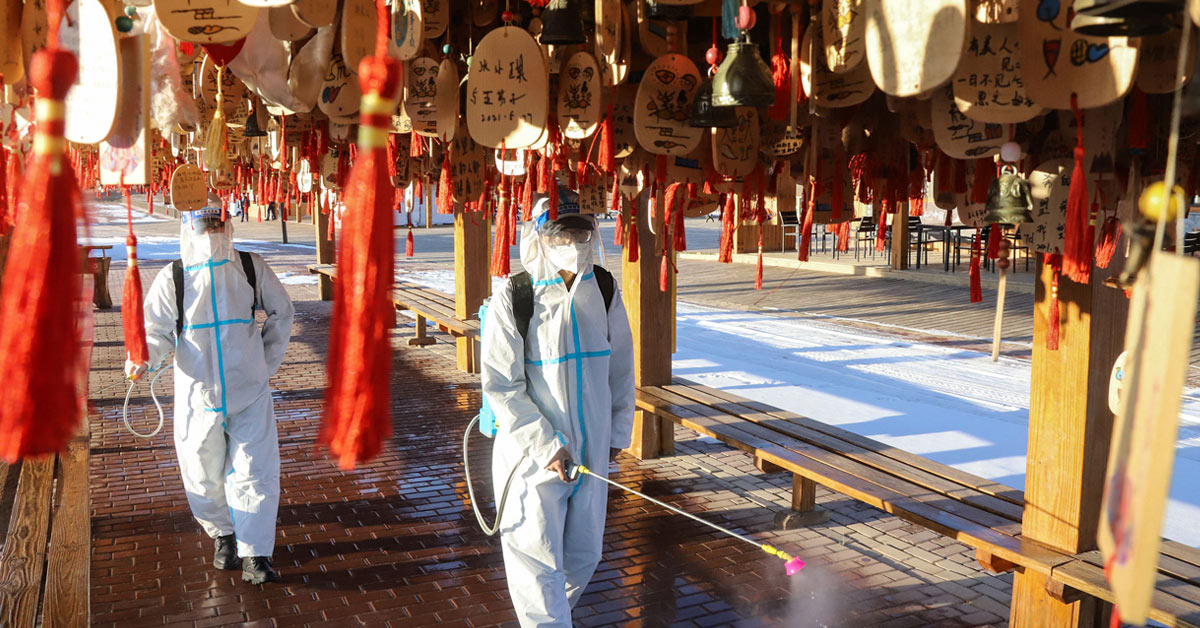China could retain its tight border restrictions for the whole of the year as it prepares to host the Winter Olympics and a series of political events in 2022, Goldman Sachs Group Inc. said.
Reports that vaccines made by domestic firm Sinovac Biotech Ltd. offer limited protection against the omicron variant will likely reinforce China’s resolve to stick with its COVID Zero strategy, analysts led by Andrew Tilton wrote in a note Tuesday.
China is one of the few countries in the world that’s still committed to the COVID Zero approach, while many others have shifted toward living with the virus.
Strict measures to contain outbreaks - like the hard lockdown in Xi’an currently - have led to disruptions to production and travel, and a slump in consumption, adding pressure on an economy already weighed down by a housing market downturn.
Quarantine requirements on travellers arriving from abroad could be kept in place to avoid major disruption to the Winter Olympics, which will begin next month, the annual meeting of the national legislature in March, and the 20th Communist Party Congress in the fourth quarter, the Goldman analysts said.
President Xi Jinping is expected to secure a precedent-breaking third term during the once-in-five-year party event.
With COVID-19 likely to be widespread outside China and with the party congress approaching in the final quarter “we doubt policymakers would eliminate quarantines before then,” the analysts said. “With transmission typically higher in the winter months, it’s possible that border restrictions could be kept largely intact until spring 2023.”
China’s harsh measures to contain COVID won’t work as well this year as they did in 2020, said Ian Bremmer, president of the Eurasia Group, a political risk consulting firm. That means supply chain challenges will continue across the world, and inflation may persist longer than people otherwise would have expected, he said.
“The ability to live with the virus, an extremely easily transmissible virus that isn’t as fatal, is the exact opposite of China’s policy of zero COVID, and zero COVID will not work for them. But they’re going to stick with it,” Bremmer told Bloomberg TV. “It’s not primarily a virus-driven challenge, but it’s one that the Chinese government can’t get out of their way on.”
Beijing has vowed to shift its policy focus this year to stabilizing economic growth from preventing risks, as it warns of a triple whammy of contracting demand, a supply shock, and weakening expectations.
The central bank last month boosted liquidity by cutting the amount of cash lenders must keep in reserve. The authorities have also said they will better meet what they term as “reasonable demand” for homes as they move to limit the fallout from a widening debt crisis engulfing the country’s real estate industry.
Goldman expects another reduction in the reserve requirement ratio in the first quarter, with easing focused on credit and fiscal measures cushioning but not fully absorbing the downturn in the housing market.
Rest Of Asia
The yuan could see “small further gains” to 6.2 per dollar by the end of this year as China maintains a “meaningful” current account surplus, the analysts said. Also helping the Chinese currency would be solid net portfolio inflows driven by index inclusions and potential acceleration in equity purchases by foreigners with domestic stocks likely performing better this year than last, they added.
For the rest of Asia, a shift to ‘living with COVID’ will likely dominate the economic response to the pandemic, with overall inflation unlikely to accelerate significantly further from current levels as central banks raise interest rates, led by New Zealand, South Korea and Singapore.
“We expect all three to tighten further in 2022, and to be joined by many of their peers in the region,” the Goldman analysts wrote.
“The next group of central banks most likely to hike, in our view, are India, Malaysia, Indonesia, and Taiwan.”
Japan’s economy will likely expand 2.7 percent, which would be the fastest pace in a decade, lifted by fiscal easing and global demand.
